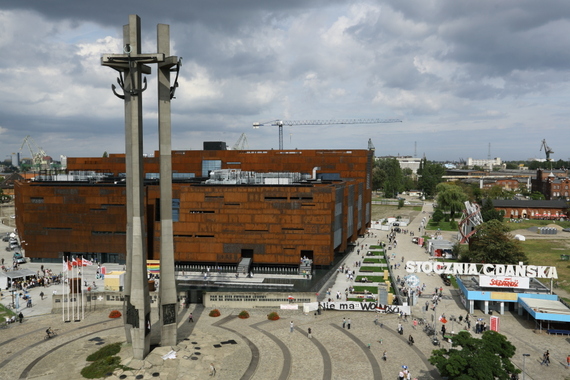The European Solidarity Centre in Gdańsk, Poland honoured with The Council of Europe Museum Prize for 2016.
It gives me a thrill to know that the idea and a big purpose we have been working for for 35 years, has come to a wonderful fruition. It was Lech Wałęsa's insight to create a centre, right where the Solidarity revolution started in 1980, to attract young and all to reflect on the ideas of freedom and solidarity.
The Council of Europe Museum Prize for 2016 - which is a recognition of excellence - has been awarded to the European Solidarity Centre in Gdansk. It is worth reminding that in the first year of activity in the new seat at 1 Solidarity Square in Gdańsk ECS was visited by 390 thousand guests.
It was erected in 2014 and looks like a body of a big ship - ready to be launched in the bay. It houses an award-winning permanent exhibition, an archive, a library, a think-tank, and offices of non-governmental organizations. And last week it received a prestigious European Council Prize.
The Centre was acknowledged as one being flexible enough to initiate and reflect on social and political processes taking place in Syria, Egypt, Ukraine and Russia. It has proved to be effective in bringing world leaders and common citizens to sit together and talk. Through multiple projects and initiatives it has been redirecting the European narrative away from constructing more walls. In order to award the best in the category, a shortlist of three museums was selected from 49 candidates.
According to the rapporteur on the Museum Prize in the Parliamentary Assembly of the Council of Europe, Vesna Marjanovic (Serbia, SOC), this museum is "a fascinating example of a cultural institution working to promote freedom and solidarity. The events it recounts and its programme make it a forum for modern Europe. It succeeds in making the history of the trade union Solidarność a powerful and moving source of inspiration for civic engagement and action. The Centre connects history with life and makes a direct link between culture and democracy.
Twenty-five years after the fall of the Berlin Wall, thoughts are returning of building new walls. The European Solidarity Centre's aim is to provide factual back-up for organisations working for the common good, freedom and human rights".
The Council of Europe Museum Prize forms part of the European Museum of the Year Awards (EMYA). It has been awarded annually since 1977 to a museum judged to have made a significant contribution to the understanding of European cultural heritage as a factor uniting the Council of Europe's 47 member states. This prestigious prize is awarded based on the recommendations of the EMYA Judging Panel, by the Committee on Culture, Science and Education of the Parliamentary Assembly of the Council of Europe.
The winning museum will be presented with a bronze statuette, "La femme aux beaux seins" by Joan Miró, which the museum will keep for a year, together with a diploma. The final choice is decided on the basis of a shortlist presented by a jury of the European Museum Forum
Recent winners of the prize include the MUCEM in Marseille, France (2015), the Baksi Museum in Turkey (2014) and the Museum of Liverpool in the United Kingdom (2013).
ECS was honoured by the Culture Committee of the Parliamentary Assembly of the Council of Europe (PACE) at a meeting in Paris on the 4th of December 2015. The awarding ceremony will take place in April 2016, during a plenary session of the Parliamentary Assembly.
We in Gdańsk, and Poland want the European Solidarity Centre to grow as a forum, an agora to freely discuss what gives the nations freedom, and what restricts it. Waiting for you!

